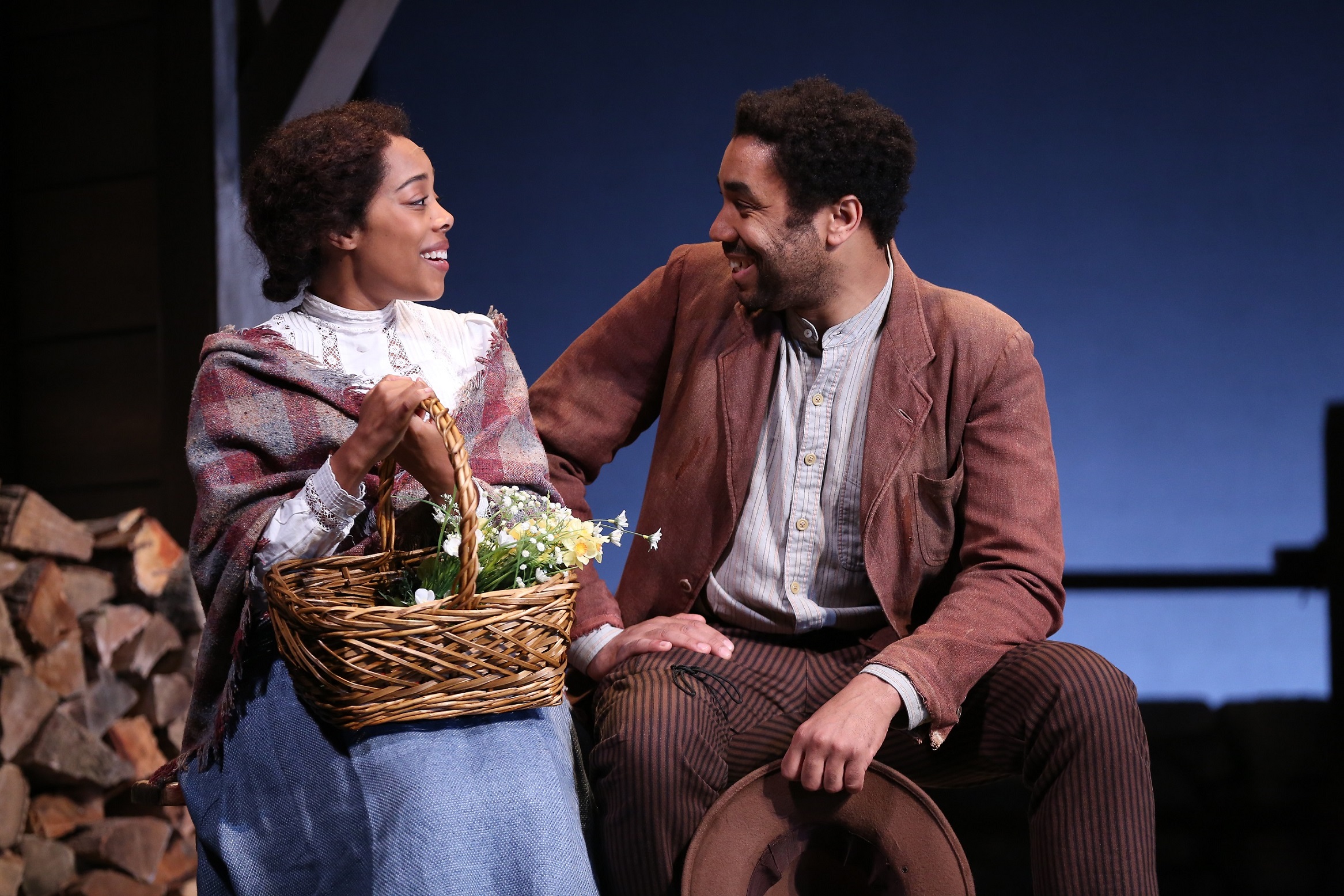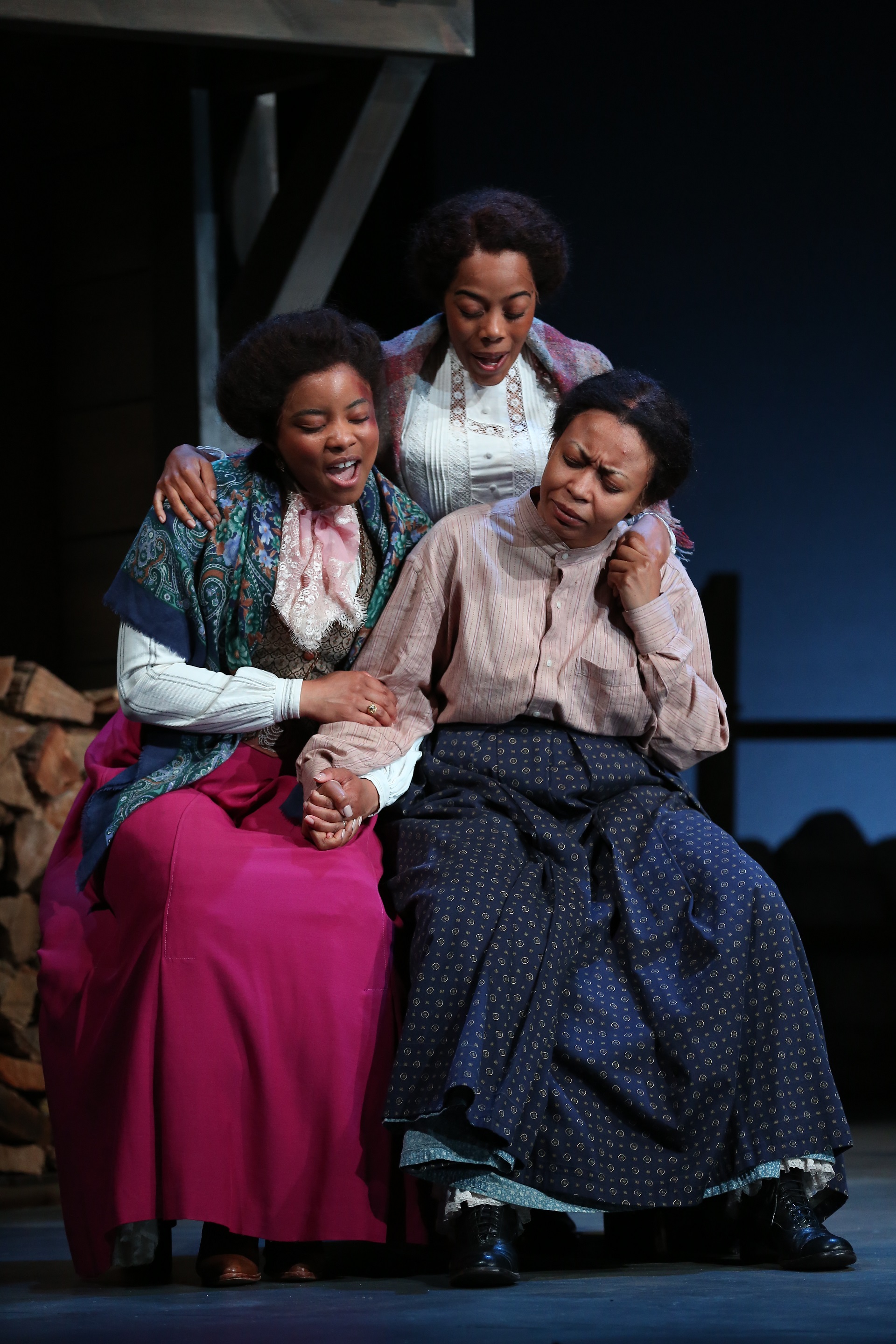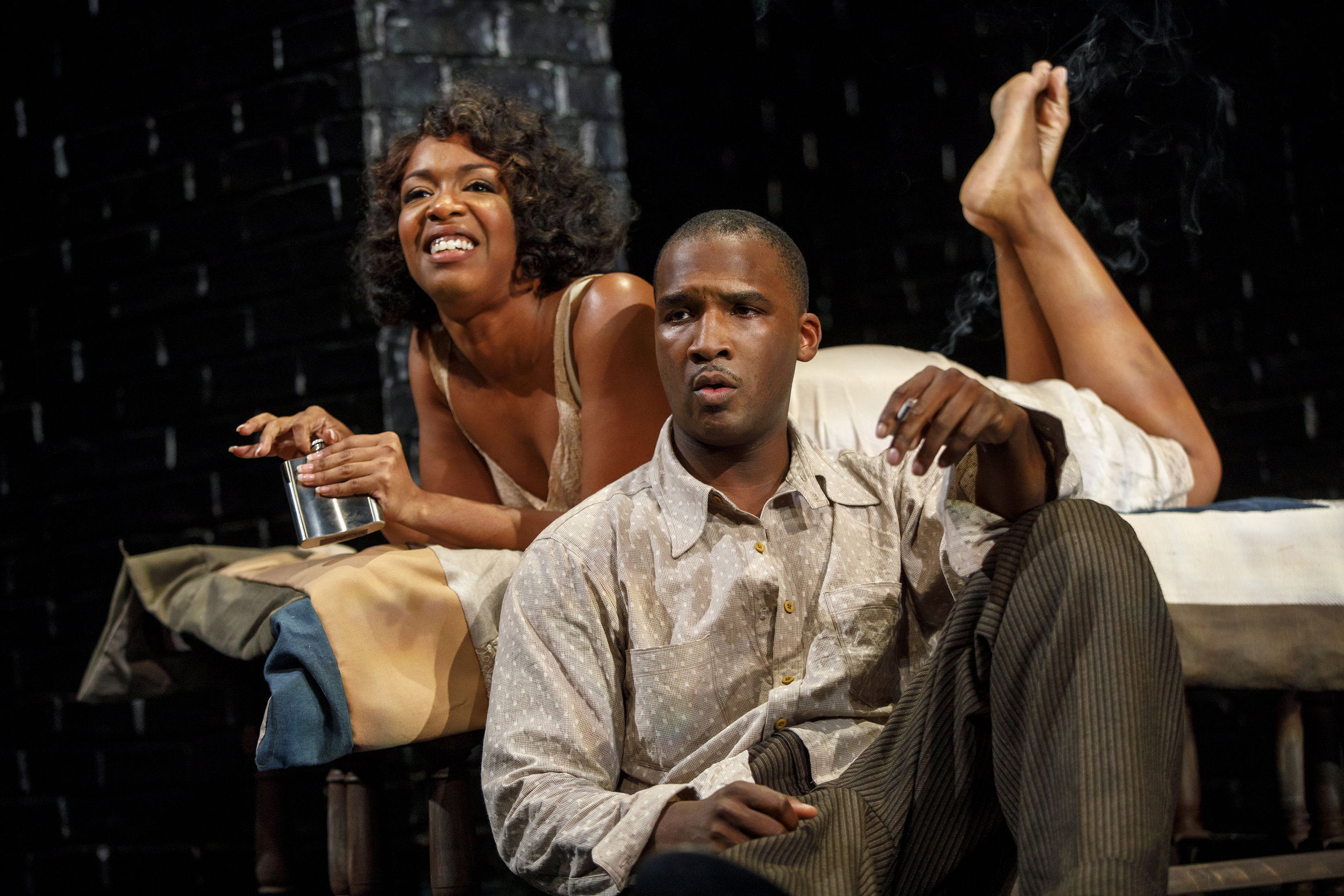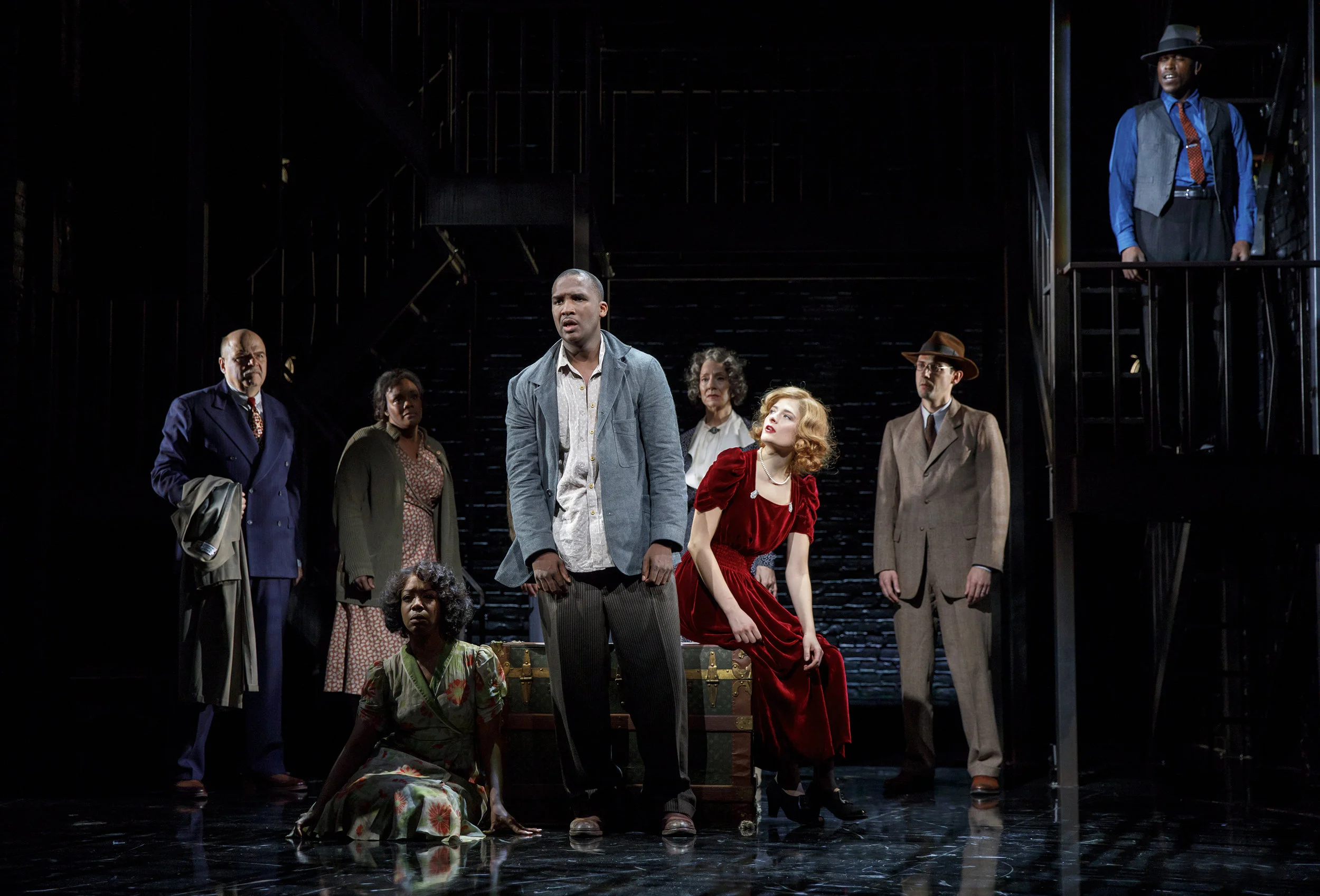Review of Flyin’ West, Westport Country Playhouse
A Western set in the town of Nicodemus, Kansas, a settlement established by African Americans after the Civil War, finds its way toward a non-white version of Americana, or the tales we like to tell ourselves about the pluck and determination of our settler forebears. Here, the cast is entirely “colored” (as they would have been identified at the time) with at least one able to “pass,” or live as if a white person. All of which means that Pearl Cleage’s engaging Flyin’ West, at Westport County Playhouse, directed by Seret Scott, dramatizes a saga often overlooked in the many stories of immigrant populations finding their little slice of the American dream: how the first free generation descending from slave ancestors heard and heeded the call to “go west.” And how that story is as much a part of the sustaining myth of the Great Plains as any, or should be. Flyin’ West helps to make that case.
Seret Scott, who directed the much more intense and disturbing Native Son at Yale Repertory Theatre last fall, shows her grasp of the comedy, the heartache, the trials and tribulations of a sort of “three sisters” of the Prairie. Cleage’s script exults in the kind of melodramatic turns that make stories of family and community bonding so near and dear to the hearts of so many. Here, the story isn’t about pining after glory days in a grand place, but rather the value of holding onto what one has and seeing its worth.
Miss Leah (Brenda Pressley) (photographs by Carol Rosegg)
A great asset of the production is Brenda Pressley as Miss Leah, a local matriarch who enters Majorie Bradley Kellogg’s handsomely rustic set fully in possession, not only of the setting but of her sense of her own dignity. The latter may need to be asserted against the bossy determination of Sophia Washington (Nikiya Mathis), the eldest of the three young women who grew up in the house, and the one most familiar with Miss Leah’s attitudes. The play’s opening features a wry but loving joust between these two strong-willed women, set in their ways.
Fannie Dove (Brittany Bradford), Wil Parish (Edward O'Blenis)
The other two sisters are the fresh-faced and docile Fannie Dove (Brittany Bradford), whom local handyman Wil Parish (Edward O’Blenis) is sweet on, and married Minnie Dove Charles (Keona Welch) who returns to the homestead shortly before her twenty-first birthday with her husband Frank Charles (Michael Chenevert), a poet with a high opinion of himself and a low opinion of the Midwest in general and Nicodemus in particular. It all might devolve into a case of country mouse vs. city mouse but for the fact that there’s a bit more at stake. The town of Nicodemus is comprised entirely of African Americans and Sophie, more than the rest, sees how important it is that the folks of the town stick together and not sell off its land in parcels to land speculators and white folks with money. Times are changing in Nicodemus, as it moves from a town all but forgotten to one that might be of value to land-grabbers looking to expand.
Minnie Dove Charles (Keona Welch), Frank Charles (Michael Chenevert), Miss Leah (Brenda Pressley), Fannie Dove (Brittany Bradford), Sophie Washington (Nikiya Mathis)
The story of how the West was won, and bought and sold, is familiar terrain, perhaps, but rarely is it given a racial dimension. Here, the abolitionist tradition of Kansas helps to create a world, in the play, where these characters can shape their own destinies, even under patriarchy. For that’s the other threat here, which is even more immediate than white folks nosing around for a sweet piece of land on the cheap. The villain of the piece is that high-and-mighty Mr. Charles, able to pass for white and able to treat his own wife as his menial. What’s more, he has a violent temper, and is looking to make it big any way he can.
The main tension centers on how Frank Charles’ intentions will be dealt with or met by the women of the place. Wil Parish is quick to assert his own courteous attitudes toward the womenfolk and that’s all to the good, but not even his willingness to deal with Frank, man-to-man, can carry the day. This is a situation for the women to handle for themselves, and gun-toting Sophie isn’t shy about what it might take to scare Frank off or change his tune. Miss Leah has another plan, and it leads to the play’s high-point, a monologue of action and speech, perfectly timed and vastly entertaining, inciting what might be called a somewhat macabre belly-laugh. Brenda Pressley commands the stage and what befalls follows from Miss Leah’s command of certain secrets she learned back on the plantation. Another rousing speech delivered by Pressley tells of how she lost all her sons to slavery and how she herself made it to freedom. The history behind the story is more dramatic than much of what is on stage, but there are many sharp stabs in the dialogue, and, in the action, a telling recognition of how often justice, on the American frontier, was a case of who had the upper-hand. Thank God things are so much better now!
Minnie Dove Charles (Keona Welch), Fannie Dove (Brittany Bradford), Sophie Washington (Nikiya Mathis)
The set, with its indoors and outdoors fully viewable, perfectly suited to the action, and the lighting by Stephen Strawbridge and sound design by Fred Kennedy, add greatly to the show’s realism, as do costumes by Heidi Leigh Hanson that show off the different self-conceptions of the sisters and Frank’s near-dandified air, which includes credit to J. Jared Janas’ work on hair. Some impromptu songs let us share in the familiarity of these women with one another, though the song choices might be the same if meant as a parody of homespun cliché.
A familiar sort of story with a familiar sort of family dynamic, with an added treatment of a threat reminiscent of The Beguiled, adds up to a story with prickly sort of uplift.
Flyin’ West
By Pearl Cleage
Directed by Seret Scott
Scenic Design: Marjorie Bradley Kellogg; Costume Design: Heidi Leigh Hanson; Lighting Design: Stephen Strawbridge; Sound Design: Frederick Kennedy; Fight Director: Michael Rossmy; Wig, Hair and Makeup Designer: J. Jared Janas; Production Stage Manager: Alice M. Pollitt
Cast: Brittany Bradford, Michael Chenevert, Nikiya Mathis, Edward O’Blenis, Brenda Pressley, Keona Welch
Westport Country Playhouse
May 29-June 16, 2018








